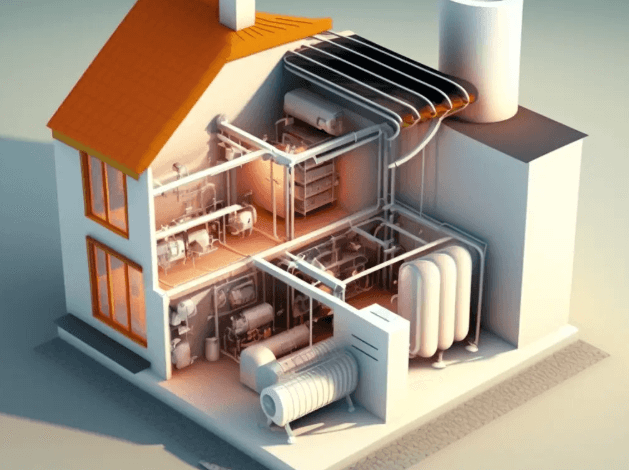Replacement of Your Heating System: Why, When, and How?

In winter, during periods of freezing, you may experience malfunctions in your heating system. An old or poorly maintained heating system can negatively affect your comfort. The impact on your energy bills is also significant. If your heating equipment is aging, it is in your best interest to replace your heating system. For those in need of expert assistance, a Sacramento furnace replacement company can ensure you get a modern, energy-efficient system suited to your needs. The lifespan of heating systems varies depending on the quality of the system, maintenance conditions, and changes in regulations.
Why replace your heating?
Replacing your heating is sometimes necessary to increase your comfort and reduce the amount on your energy bills. The issue is also environmental since heating is the largest source of energy consumption in the home.
Increase thermal comfort
Thermal comfort is related to the heat felt in the home. It can be impacted by different factors such as ambient and radiant temperature, air movements, humidity, or even insulation. To improve this comfort, it may be necessary to replace the heating, especially if the current equipment is aging or inefficient.
The concept of thermal comfort is specific to each person. It depends on the sensitivity to cold, the clothing, or the activity of the inhabitants. In the home, the occupants produce metabolic heat. The more mobile they are, the higher the temperature felt. People with reduced mobility or who move little in the home often feel a colder temperature, which may justify the need to change to a more efficient system.
In winter, the heating system therefore plays a major role in improving thermal comfort. The quality of the heating equipment is therefore an important parameter in improving thermal comfort. With a non-efficient or obsolete system, the risk of overconsumption is inevitable, making the need to change heating even more relevant.
Improve indoor air quality
Contrary to popular belief, the quality of indoor air in the home is not necessarily better than that of outdoor air. Fuels, dust, and mites; cleaning products, paints; invisible gases… Many substances pollute the air we breathe in the home. To replace heating and thus improve this quality, it is important to consider the impact of heating systems on indoor air.
The World Health Organization has stated that more than 6.7 million premature deaths worldwide are linked to household air pollution. Indeed, indoor air pollution can cause serious diseases such as stroke, heart disease, and lung cancer. In this sense, replacing your heating can play a decisive role in reducing these risks.
Indoor air quality is, therefore more than ever an issue to be taken into account. Heating appliances can be a source of pollution, especially if they are poorly maintained. Some equipment that furnace replacement companies provide, such as open fireplaces, release more fine particles than others. It is therefore essential to replace with a more reliable and efficient system to improve indoor air quality.
Reduce energy consumption
Energy bills can double depending on the heating system used. If the heating installed is not efficient, residents are forced to overconsume to benefit from a pleasant temperature. In this context, changing heating becomes crucial to optimize energy consumption.
To reduce your energy consumption, installing an efficient and energy-efficient heating system is therefore essential. Some devices are also equipped with a device that automatically regulates the temperature to avoid overconsumption. Thus, when you find furnace replacement firm and efficiently replace your heating with a more efficient model, you will significantly reduce your energy bills while improving the thermal comfort of your home.
Act for the environment
The energy we consume doesn’t just impact our bills. The production of energy needed for our daily lives accelerates global warming. When they are produced, fossil fuels (gas, coal, oil, etc.) emit greenhouse gases that leave too high an ecological footprint.
Global warming has dramatic effects on the planet and populations:
- Melting ice and rising sea levels
- Increase in the number of earthquakes
- Ocean acidification and deoxygenation
- Increase in heat waves, heat waves, and droughts
- Extreme weather events: precipitation, storms, floods, fires, etc.
- and more consequences
To reduce this impact, replacing your heating system can be an effective action. Opting for an energy-efficient heating appliance is a concrete step to contribute to protecting the environment.
When should you replace your heating?
If you have noticed malfunctions in your heating and depending on the age of your current system, it may be time to replace your heating. Ask yourself about the performance of your heating:
- Do you enjoy satisfactory thermal comfort?
- Is your energy consumption reasonable?
- Is the heat distributed in your home well?
- Is it possible to regulate the temperature in the different rooms?
If the answer to these questions is no, you should probably consider replacing your heating system. The renewal of the heating system can be carried out all year round. However, it is recommended to avoid replacing the heating system during the winter as this results in the heating being cut off. Spring is the ideal season to start an energy renovation.
Which heating to choose?
There is no ready-made answer to this question. There are numerous heating solutions. The choice must be based on a set of criteria: comfort needs, layout constraints, budget, etc. When you are considering changing your heating, it is important to take these different aspects into account.
A system compatible with its energy source
For renovation projects, the most economical solution is to choose a heating system that is compatible with the energy source used. It is always possible to change energy but this generates additional costs unless you opt for a complementary energy source that will optimize your consumption.
Efficient and space-saving heating
Heating systems can distribute heat in different ways: by convection (by heating the air), by radiation (without air circulation), by inertia (with heat accumulation), or at low temperatures. When you decide to change your heating, it is important to choose a system that meets your needs in terms of efficiency and practicality.
Focus on baseboard heating
Switching to baseboard heating is the ideal solution for heating your home efficiently and discreetly. Compatible with all energy sources, it uses convection, inertia, and radiation. Unlike underfloor heating, baseboard heating eliminates the “cold wall” effect on walls and windows.
Conclusion
Before changing your heating, you should check your insulation system and find out about the assistance provided by Alpha Mechanical for the energy renovation of housing. Heating is not the only source of discomfort and increased energy costs. If your home is poorly insulated, the heat emitted by your heating system may escape to the outside, making the heating less efficient. To optimize the performance of your heating, it is essential to change your heating system in parallel with improving the insulation of your home.





